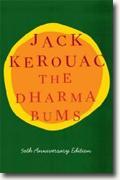The Dharma Bums
Jack Kerouac
book reviews:
· general fiction
· chick lit/romance
· sci-fi/fantasy
· graphic novels
· nonfiction
· audio books
· author interviews
· children's books @
curledupkids.com
· DVD reviews @
curledupdvd.com
newsletter
win books
buy online
links
home
for authors
& publishers
for reviewers

 |
The Dharma Bums: 50th Anniversary Edition Jack Kerouac Viking Hardcover 224 pages September 2008 |
|
Lyrical, moving, poetic, more real than real, The Dharma Bums
This knowledge to him and many Buddhists brings him happiness as well as sadness. A Catholic all his life, Ray does not substitute Buddha for Christ and Buddhism for Catholicism but sees the ways they are similar. At their best, both reveal deep truths and have the power to change people’s lives for the better. He equates, it seems, the road to becoming a Bodhisattva and attaining the spiritual enlightenment of Nirvana to becoming more Christlike, loving and forgiving to everyone. While Japhy Ryder (the Zen poet Gary Synder) is the biggest influence on Ray’s life, he questions why Ray still maintains his belief in God and Christ. Japhy, with his goatee, brings to mind for Ray how he imagines a Chinese Zen Buddhist might look, with a mischievous twinkle in his eye but with a heart and soul that cries out to and embraces and loves everyone and everything in the universe. Japhy gives freely of his possessions to Ray and to others, letting Smith have his sneakers when they climb up the Matterhorn in California during one of the novel’s high points and times of bliss and happiness - satori - in Ray’s life. Ray does not make it to the pinnacle of the Matterhorn but rationalizes that the climbing of it, his feelings of happiness, and his time spent with his friend Japhy are more important than making it to the top, though he envies Japhy for having done it. Who are “Dharma Bums,” one might ask? Why should we be interested in reading about them and maybe even want to be like them, if only in our imaginations? They are searchers and wanderers, like the Chinese wise men and mountain hermits of brush paintings; they are you and I; they’re anyone who searches for and yearns after dharma, the eternal truth about the way things are and will always be. The word “bums” is not meant to be derogatory or disparaging, but it acknowledges that none of us is any better than anyone else, that we all are born and all will die - we’re all in this together, for the better or worse. We’re bums, poets, politicians, priests, ordinary human beings following different paths and careers - but basically, we’re all the same. Whether one is reading The Dharma Bums Originally published on Curled Up With A Good Book at www.curledup.com. © Douglas R. Cobb, 2008 |
| Also by or about Jack Kerouac: |
|
|
|
 Click here to learn more about this month's sponsor! |
|
| fiction · sf/f · comic books · nonfiction · audio newsletter · free book contest · buy books online review index · links · · authors & publishers reviewers |
|
| site by ELBO Computing Resources, Inc. | |
 In
In